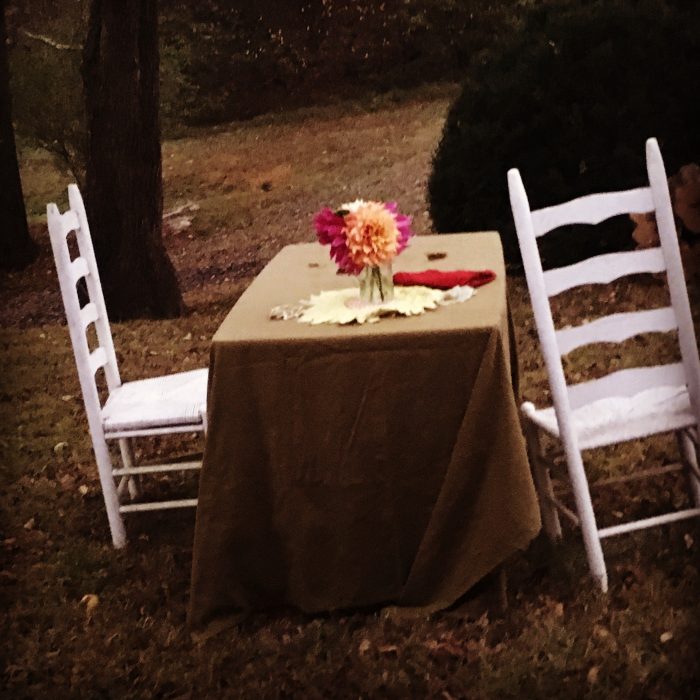We are natural born lovers, with a strong willingness to connect in the hopes of creating a partnership. We are fed fairy tale lies of happily ever after, even when we are unwilling or unable to do the necessary work. We focus on beautiful and positive qualities, pushing away the negatives for the sake of peace.
What happens once we are mired in the relationship or don’t have the energy or tools to cope with the issues?
We stay. We suffer. We become surly. We live together as roommates. We financially invest in each other’s lives so that there is no way out. We become old together, living in separate bedrooms, holing ourselves up with our own hobbies. After 50 years of sexless marriage we allow the world to believe that marriage lasts forever. We pretend that this is better than God-forsaken divorce.
Keeping the peace may feel good in the moment, but setting boundaries and sharing needs from the very beginning of a relationship is the best advice for new “love.” This is the first step in knowing whether the two of you are on the same trajectory for intellectual intimacy. This will help you understand if, beyond the pheromones, you are emotionally compatible for the bigger things to come.
Self-Worth
When a potential partner says, “I can’t believe you would date somebody like me…,” take heed. This should not be taken on as a new personal challenge. No matter what you say or do, people need to see their own self-worth, on their own terms. Are they happy with who they are? Are they happy with their life? Or are they looking for you to make them happy?
While self-deprecation is often the most hilarious type of humor, be careful for hidden truths or just self-deprecation for the sake of outside approval. An even brighter red flag is the compensatory inflamed ego that can be confused with extreme confidence. People trying to constantly prove themselves, their intelligence, their abilities, their knowledge of every subject, are actually hurting, no matter how obnoxious they come across. Include those who are obsessed with their looks. They may be incredibly beautiful and outwardly put together, but if they don’t believe that, you will never ever convince them. They will lash out at you each time they realize they have failed to hide their flaws. They have to find self-love on their own.
Entering a relationship with someone without self-worth can be a disaster for someone with an open heart and loose boundaries. Firm boundaries need to be set from the beginning, which is difficult, because that’s when both people are more likely to forgive, relent, and compromise so the romantic feelings and amazing sex can thrive. This is long before resentment sets in. A year or two into the relationship is when the fallout takes place because the boundaries were never set. It becomes shocking to hear your partner say that you have been gritting your teeth every single time he yells at your kids. Also, because you’ve been on edge over the situation, and unsure of how to approach it, you finally snap, rather than meaningfully communicate. The surprised partner is then unwilling to accept the new boundaries. Even worse, they may be emotionally and spiritually incapable of accepting them, only now the relationship is pretty intertwined and involved. What becomes glaringly evident, is a lack of developmental compatibility. Is this person capable of spiritual growth? We may be setting the boundaries, but can they accept them?
Ways in which an unhealthy person responds to a boundary may sound like:
- Denial: “You are trying to make me admit to doing something that I did not do,”
- Deferment: “But you always…”
- Excuse: “I’m not a mind-reader”
- Blame: “You are too critical”
- Sidestepping: “You were yelling at me” or “It was the way you asked for it that offended me”
- Inability to accept responsibility: “Sorry YOU were offended”
Superficial relationships do not feed the soul. Loving relationships have deep connections. Each person feels seen. They are caught off-guard in these moments, in a beautiful, loving way. They feel loved, regardless of their many faults as humans, some of them glaring. We shine our lover’s pearls, because we want them to understand their worthiness, especially to us. However, if they don’t recognize it, our loving words and actions fall on deaf ears. We end up falling in love with their potential, rather than what sits before us. Perhaps it is possible to remain with someone who doesn’t see their own worth, but it is not possible to have a healthy relationship when they cannot admit their faults, or be willing to at least have an awareness of the damage they are causing to themselves and the people around them.
Unconditional love is a real thing. What’s important, is knowing how far from the fire is a safe distance to stand. You can love a person and decide not to be with them for your own emotional safety. It is a heartbreaking but necessary move to make if you are looking for a truly compatible relationship.
It isn’t until partners are deeply enmeshed into each other’s lives that the glaring qualities become noticeable. This is not a cause for judgement. Everyone has unfavorable qualities. We can’t be compatible in every single way. It’s ok. What needs to be addressed, is the fallout that occurs when those boundaries are set. A person with a lot of shame may react with anger, tears, denial, disappointment, and blame: Gas Lighting. Rather than accepting their own behaviors, they may blame you for triggering them. It is your fault that they are acting this way. They want you to take your part. So you do. But the boundary goes ignored. They may even accuse the boundary-setter as being overly critical or intolerant, just so they don’t have to look at themselves through your eyes.
Using “I” statements is critical during this time. No matter how they respond, keep saying, “I feel uncomfortable when…” so they understand you are trying to give them the recipe for your love, rather than criticize them. They still may not be able to hear it.
“A soulmate is the one person whose love is powerful enough to motivate you to meet your soul, to do the emotional work of self-discovery, of awakening,” Kenny Loggins.
It is a soul-crushing moment when you realize that you are “not enough” for your partner to do this. It’s hard not to self-loathe and ask one’s self, “Why?? Why was I not enough? What could I have done better or differently?”
Setting boundaries and giving consequences is an art, and it is one that when taught to children, will grow accountable adults. Accountability makes for self-honesty and enriching relationships beyond the starry-eyed, mad, pheromone attraction that is so easy to get caught up in. The romantic in all of us wants to be “happily ever after”, but it’s not possible to skip over the work getting there.
Without clear boundaries we are enabling abusive or unacceptable behaviors. We prevent them from their own growth if they are led to believe that all behaviors are acceptable and people will enter or remain in their lives no matter what.
“I’m sorry” is a great way to begin taking accountability, and it can melt a lot of the terror. However, do they actually want to stop hurting their partner? For that to happen, the behavior must change. Letting it go after the apology can offer relief, but it doesn’t ensure the exact same argument won’t happen again tomorrow. They will continue to bask in being consoled that it is ok, but that is temporary as long the offensive behavior has not been addressed.
Being open and vulnerable provides beautiful positive consequences and love-filled connections. Anything less than that removes the hope for a trusting, mutually respectful life-lasting love.
Psychotherapists teach that if a person is unwilling to accept boundaries, or unwilling to learn how and why to accept them, “Well then end the relationship, because people who cannot accept boundaries have trauma and unhealthy attachment. They feel shame and rejection when boundaries are set.”
Rather than accepting the boundary they may say:
- “You are too sensitive”
- “That’s not really important to me”
- “You’ve upset me and should apologize – take your part”
- “I wish you could find your sense of humor – I was just kidding”
- “Please don’t scold me”
- “You had an expectation and did not communicate it”
While the person setting the boundaries should use “I” statements, the person receiving those boundaries needs to be willing to say:
- “I am sorry that I crossed a boundary of yours”
- Thank you for sharing your needs. I will try to meet those needs”
- “Your feelings are important to me, but I need to think about that before I respond”
- Naming the impact: “I see that I hurt you when…I will try not to do that any more”
- Make amends: “What can I do…?”
We are in a world of limitless options. We have access to literally every other person in the world. This is a new phenomenon. Even just in the 1950s travel was difficult and rare. We only knew the people in our direct community. There were only a handful of people in our age-range, maybe not even with similar interests. One person in the relationship worked, which means the other person couldn’t make it on their own even they wanted to leave. People feared hurting the children by leaving the relationship, even though instead they were choosing to provide a horrible example of life and love. Our families lived nearby us in the same community to offer help.
None of this is true any more, and as a result, we are choosing to be together for very different reasons. We cannot compare ourselves to our parents’ marriages. We want to be together for compatibility, but even more so, for heart partnerships, deep connections and happiness. We don’t have to be stuck. We are no longer reliant on each other for much more than love. Anything after that is a bonus. So if that’s what you want, be willing to do the work. Create your happy ending. That isn’t something that happens to you.







Read 0 comments and reply